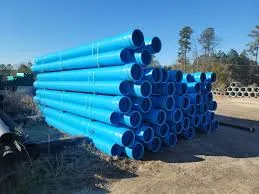Nov . 08, 2024 23:48 Back to list
Applications and Benefits of HDPE Water Supply Pipes in Modern Infrastructure
The Importance of HDPE Water Supply Pipes in Modern Infrastructure
In the realm of modern infrastructure, the choice of materials used in water supply systems is crucial. High-Density Polyethylene (HDPE) pipes have gained significant attention and popularity in recent years, particularly in water supply applications. This article will explore the benefits and advantages of HDPE water supply pipes, their applications, and why they are becoming the preferred choice for engineers and municipalities worldwide.
What is HDPE?
High-Density Polyethylene (HDPE) is a thermoplastic polymer known for its strength-to-density ratio. It is manufactured through the polymerization of ethylene, producing a material with remarkable properties. HDPE is characterized by its high tensile strength, resistance to impact, immunity to rot or corrosion, and a long service life, making it an ideal material for various applications, particularly in water supply systems.
Advantages of HDPE Water Supply Pipes
1. Durability and Longevity One of the standout features of HDPE pipes is their durability. They can withstand extreme temperatures and harsh environmental conditions without losing their integrity. The life span of HDPE pipes can exceed 50 years, significantly reducing the need for frequent replacements.
2. Corrosion Resistance Unlike traditional materials such as metal or concrete, HDPE pipes do not corrode, rust, or suffer from chemical degradation. This makes them particularly advantageous in environments where corrosive soil conditions exist, ensuring that the water supply remains safe for consumption.
3. Flexibility and Lightweight HDPE pipes are flexible, which allows for easy installation even in challenging terrains. Their lightweight nature reduces transportation and installation costs, making them a cost-effective option for municipalities and contractors.
hdpe water supply pipe service

4. Joint Integrity HDPE pipes can be joined using heat fusion techniques, creating a joint that is as strong as the pipe itself. This eliminates leaks, a common problem in traditional piping systems, and ensures the integrity of the water supply.
5. Low Friction Loss The smooth interior surface of HDPE pipes decreases friction loss when water flows through, leading to greater efficiency in water distribution. This can result in reduced energy costs for pumps and less demand on water treatment facilities.
6. Environmental Impact Being a recyclable material, HDPE is an environmentally friendly option. Its production generates fewer pollutants compared to traditional piping materials, and the ability to recycle it extends its lifecycle, contributing positively to sustainability efforts.
Applications of HDPE Water Supply Pipes
HDPE water supply pipes are versatile and can be utilized in a variety of applications. They are commonly used in municipal water distribution systems, irrigation systems, and industrial water supply networks. Additionally, these pipes are also employed in residential plumbing systems, stormwater management, and even in the transportation of hazardous materials due to their robustness.
Conclusion
In summary, HDPE water supply pipes represent a significant advancement in infrastructure technology. Their numerous advantages—including durability, corrosion resistance, flexibility, and environmental sustainability—make them an ideal choice for modern water supply systems. As cities continue to grow and face challenges related to water infrastructure, adopting HDPE pipes will be crucial in ensuring safe, reliable, and efficient water delivery. With ongoing innovations and improvements in pipe technology, it is clear that HDPE will play a vital role in the future of water supply systems worldwide.
-
High-Quality PVC Borehole Pipes Durable & Versatile Pipe Solutions
NewsJul.08,2025
-
High-Quality PVC Perforated Pipes for Efficient Drainage Leading Manufacturers & Factories
NewsJul.08,2025
-
High-Quality PVC Borehole Pipes Durable Pipe Solutions by Leading Manufacturer
NewsJul.08,2025
-
High-Quality PVC Borehole Pipes Reliable PVC Pipe Manufacturer Solutions
NewsJul.07,2025
-
High-Quality UPVC Drain Pipes Durable HDPE & Drain Pipe Solutions
NewsJul.07,2025
-
High-Quality Conduit Pipes & HDPE Conduit Fittings Manufacturer Reliable Factory Supply
NewsJul.06,2025

